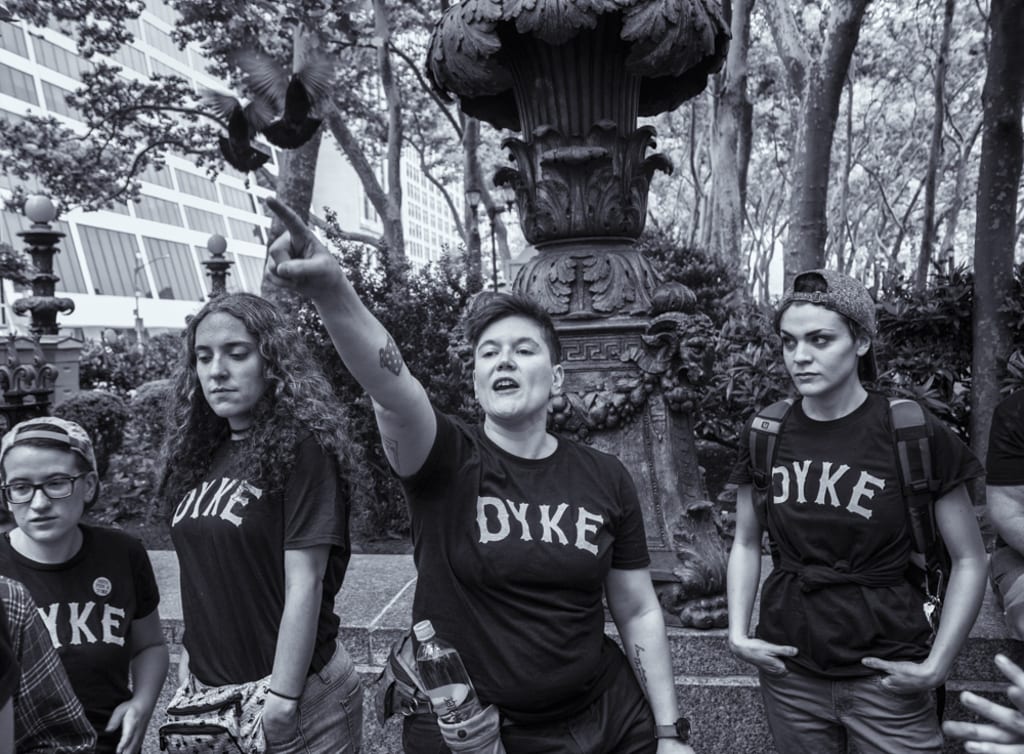Is Dyke a dirty word?
The reclamation of homophobic slurs

The history of LGBTQ+ language is ever changing and highly personal. We are constantly changing and finding new ways to express ourselves, and even take back words which were once harmful, and still are depending on who uses them, keeping them safe in our community to be reused as powerful identity markers.
I grew up in a pretty stifling town in Essex, to be out as a gay person in an area primarily populated by council estates in the 90’s and early noughties was effictively like pinning a target onto your back for homophobic abuse. My family regularly used words like ‘Poofter’ and ‘Dyke’ and it came to be that even the word Gay was used to describe something that was bad, everything on the TV that was remotely homosexual was quickly switched off to a chorus of disgusted noises.
It wasn't until I moved to Brighton at 20 that I began to hear words once used offensively or threateningly in a way that bound the people together instead of singling them out. That's not to say that here we don't experience our fair share of homophobia, as a gay woman I have even been told that the word Lesbian is offensive by a gay male couple, which I took to be a largely Patriarchal issue and not a homophobic one as they followed it with the question of whether I had tried to find a nice man and simply failed at it. So where do we stand on what’s okay to say? The answer seems to be a question of ownership and the disarmament of words.
I’ve enlisted some fabulous gay women to help me with this one, as the word isn't mine alone to use. My question was, “how do you feel about the word Dyke?” The question is loaded yes, as most of us have experienced some level of threat or violence along with it. The issue is further complicated by the view of what women ‘should’ be, as lesbians are so often sexualised in the media, meaning it would be distasteful to certain demographics to see them as anything other than purely feminine.
I personally have a lot of feelings about the word Dyke. I find it powerful and say it on stage as well as in my daily life to describe myself if I see fit, it removes the shock factor, and it makes me feel as connected to my community and myself as describing myself as femme or androgynous, although it’s very much a slur when used when you don't self identify as one. When I asked my first lesbian friend about it she said,
“I use it to describe myself sometimes, but only when I'm looking or feeling a certain way, so I guess its historically that dykes are seen as butch”, which I found interesting as since the question about whether its problematic or not seems to centre around whether a woman being butch is a bad thing.

Another friend raised the point that since they are femme, they would never use the word but wouldn't feel personally offended if someone used it about themselves, which her girlfriend echoed, although she also added that she uses it as an ironic term as she sees it as outdated, and not for the use of people outside of the LGBTQ+ community. One lady I asked (out of the blue I might add) said this,
“ I know it's an offensive word but when used in the right way I don't mind it! Its kind of like the lesbian version of the word fag.” What stood out to me about this is that both words mentioned are hugely jarring when used in a derogatory way, or by straight people of both genders, but I do have people in my life that use both of them about themselves and feel completely comfortable with it. However, the last gay woman I asked found it unacceptable all together, citing that,
“it’s too heavy, and for me I see it as completely negative, it's not identity related but it puts a negative weight on being androgynous or masculine”. Every person I asked said that the term didn't cause personal offence, whether it was used by themselves or not, rather it was a certainty that if the word Dyke was used by someone that had no personal experience to do with being gay, the term would be turned into a slur and therefore is unacceptable.
History has seen the ‘taking back’ of offensive words for a long time, it’s a method of owning our collective experience and removing negative stigma. Although the correct term for a homosexual woman is lesbian, I don't believe that we should be policing how people chose to self identify or term their experience.

There isn't a chance in hell that I would approach someone I barely knew and call them a Dyke, but myself and a few of my friends do use the word as we see fit, but that's the whole point. When owned and chosen it becomes our word to explore. It's not all we identify as, but sometimes it's a way of processing cultural pain or personal pasts, and sometimes it's simply how we feel that dictates what words we get to use about ourselves in the LGBTQ+ community, but the same conclusion remains regardless.
Slur words are to be used by the individual about themselves only if they want to do so, it's never okay to use these terms in jest, or to use the terms to describe someone when you have not been expressly told as you can, but it's also never okay to police peoples vocabulary about themselves if it makes them feel empowered and causes no offence to anyone else.
About the Creator
Billie Gold
A human woman, apparently






Comments
There are no comments for this story
Be the first to respond and start the conversation.